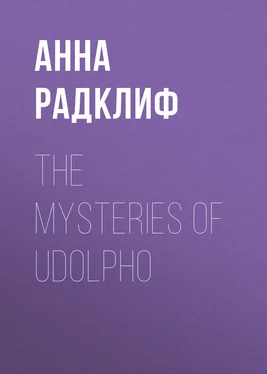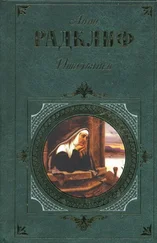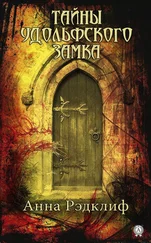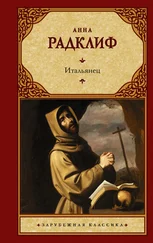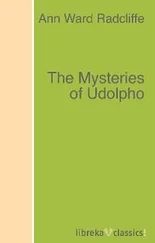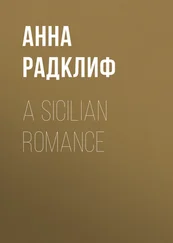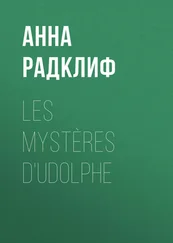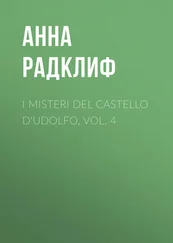Анна Радклиф - The Mysteries of Udolpho
Здесь есть возможность читать онлайн «Анна Радклиф - The Mysteries of Udolpho» — ознакомительный отрывок электронной книги совершенно бесплатно, а после прочтения отрывка купить полную версию. В некоторых случаях можно слушать аудио, скачать через торрент в формате fb2 и присутствует краткое содержание. Жанр: foreign_prose, literature_19, Ужасы и Мистика, foreign_fantasy, foreign_antique, на английском языке. Описание произведения, (предисловие) а так же отзывы посетителей доступны на портале библиотеки ЛибКат.
- Название:The Mysteries of Udolpho
- Автор:
- Жанр:
- Год:неизвестен
- ISBN:нет данных
- Рейтинг книги:5 / 5. Голосов: 1
-
Избранное:Добавить в избранное
- Отзывы:
-
Ваша оценка:
- 100
- 1
- 2
- 3
- 4
- 5
The Mysteries of Udolpho: краткое содержание, описание и аннотация
Предлагаем к чтению аннотацию, описание, краткое содержание или предисловие (зависит от того, что написал сам автор книги «The Mysteries of Udolpho»). Если вы не нашли необходимую информацию о книге — напишите в комментариях, мы постараемся отыскать её.
The Mysteries of Udolpho — читать онлайн ознакомительный отрывок
Ниже представлен текст книги, разбитый по страницам. Система сохранения места последней прочитанной страницы, позволяет с удобством читать онлайн бесплатно книгу «The Mysteries of Udolpho», без необходимости каждый раз заново искать на чём Вы остановились. Поставьте закладку, и сможете в любой момент перейти на страницу, на которой закончили чтение.
Интервал:
Закладка:
'It will certainly come down,' said M. Quesnel; 'I believe I shall plant some Lombardy poplars among the clumps of chesnut, that I shall leave of the avenue; Madame Quesnel is partial to the poplar, and tells me how much it adorns a villa of her uncle, not far from Venice.'
'On the banks of the Brenta, indeed,' continued St. Aubert, 'where its spiry form is intermingled with the pine, and the cypress, and where it plays over light and elegant porticos and colonnades, it, unquestionably, adorns the scene; but among the giants of the forest, and near a heavy gothic mansion—'
'Well, my good sir,' said M. Quesnel, 'I will not dispute with you. You must return to Paris before our ideas can at all agree. But A-PROPOS of Venice, I have some thoughts of going thither, next summer; events may call me to take possession of that same villa, too, which they tell me is the most charming that can be imagined. In that case I shall leave the improvements I mention to another year, and I may, perhaps, be tempted to stay some time in Italy.'
Emily was somewhat surprised to hear him talk of being tempted to remain abroad, after he had mentioned his presence to be so necessary at Paris, that it was with difficulty he could steal away for a month or two; but St. Aubert understood the self-importance of the man too well to wonder at this trait; and the possibility, that these projected improvements might be deferred, gave him a hope, that they might never take place.
Before they separated for the night, M. Quesnel desired to speak with St. Aubert alone, and they retired to another room, where they remained a considerable time. The subject of this conversation was not known; but, whatever it might be, St. Aubert, when he returned to the supper-room, seemed much disturbed, and a shade of sorrow sometimes fell upon his features that alarmed Madame St. Aubert. When they were alone she was tempted to enquire the occasion of it, but the delicacy of mind, which had ever appeared in his conduct, restrained her: she considered that, if St. Aubert wished her to be acquainted with the subject of his concern, he would not wait on her enquiries.
On the following day, before M. Quesnel departed, he had a second conference with St. Aubert.
The guests, after dining at the chateau, set out in the cool of the day for Epourville, whither they gave him and Madame St. Aubert a pressing invitation, prompted rather by the vanity of displaying their splendour, than by a wish to make their friends happy.
Emily returned, with delight, to the liberty which their presence had restrained, to her books, her walks, and the rational conversation of M. and Madame St. Aubert, who seemed to rejoice, no less, that they were delivered from the shackles, which arrogance and frivolity had imposed.
Madame St. Aubert excused herself from sharing their usual evening walk, complaining that she was not quite well, and St. Aubert and Emily went out together.
They chose a walk towards the mountains, intending to visit some old pensioners of St. Aubert, which, from his very moderate income, he contrived to support, though it is probable M. Quesnel, with his very large one, could not have afforded this.
After distributing to his pensioners their weekly stipends, listening patiently to the complaints of some, redressing the grievances of others, and softening the discontents of all, by the look of sympathy, and the smile of benevolence, St. Aubert returned home through the woods,
whereAt fall of eve the fairy-people throng,In various games and revelry to passThe summer night, as village stories tell.* *Thomson
'The evening gloom of woods was always delightful to me,' said St. Aubert, whose mind now experienced the sweet calm, which results from the consciousness of having done a beneficent action, and which disposes it to receive pleasure from every surrounding object. 'I remember that in my youth this gloom used to call forth to my fancy a thousand fairy visions, and romantic images; and, I own, I am not yet wholly insensible of that high enthusiasm, which wakes the poet's dream: I can linger, with solemn steps, under the deep shades, send forward a transforming eye into the distant obscurity, and listen with thrilling delight to the mystic murmuring of the woods.'
'O my dear father,' said Emily, while a sudden tear started to her eye, 'how exactly you describe what I have felt so often, and which I thought nobody had ever felt but myself! But hark! here comes the sweeping sound over the wood-tops;—now it dies away;—how solemn the stillness that succeeds! Now the breeze swells again. It is like the voice of some supernatural being—the voice of the spirit of the woods, that watches over them by night. Ah! what light is yonder? But it is gone. And now it gleams again, near the root of that large chestnut: look, sir!'
'Are you such an admirer of nature,' said St. Aubert, 'and so little acquainted with her appearances as not to know that for the glow-worm? But come,' added he gaily, 'step a little further, and we shall see fairies, perhaps; they are often companions. The glow-worm lends his light, and they in return charm him with music, and the dance. Do you see nothing tripping yonder?'
Emily laughed. 'Well, my dear sir,' said she, 'since you allow of this alliance, I may venture to own I have anticipated you; and almost dare venture to repeat some verses I made one evening in these very woods.'
'Nay,' replied St. Aubert, 'dismiss the ALMOST, and venture quite; let us hear what vagaries fancy has been playing in your mind. If she has given you one of her spells, you need not envy those of the fairies.'
'If it is strong enough to enchant your judgment, sir,' said Emily, 'while I disclose her images, I need NOT envy them. The lines go in a sort of tripping measure, which I thought might suit the subject well enough, but I fear they are too irregular.'
How pleasant is the green-wood's deep-matted shade
On a mid-summer's eve, when the fresh rain is o'er;
When the yellow beams slope, and sparkle thro' the glade,
And swiftly in the thin air the light swallows soar!
But sweeter, sweeter still, when the sun sinks to rest,
And twilight comes on, with the fairies so gay
Tripping through the forest-walk, where flow'rs, unprest,
Bow not their tall heads beneath their frolic play
To music's softest sounds they dance away the hour,
Till moon-light steals down among the trembling leaves,
And checquers all the ground, and guides them to the bow'r,
The long haunted bow'r, where the nightingale grieves.
Then no more they dance, till her sad song is done,
But, silent as the night, to her mourning attend;
And often as her dying notes their pity have won,
They vow all her sacred haunts from mortals to defend
When, down among the mountains, sinks the ev'ning star,
And the changing moon forsakes this shadowy sphere,
How cheerless would they be, tho' they fairies are,
If I, with my pale light, came not near
Yet cheerless tho' they'd be, they're ungrateful to my love!
For, often when the traveller's benighted on his way,
And I glimmer in his path, and would guide him thro' the grove,
They bind me in their magic spells to lead him far astray;
And in the mire to leave him, till the stars are all burnt out,
While, in strange-looking shapes, they frisk about the ground,
And, afar in the woods, they raise a dismal shout,
Till I shrink into my cell again for terror of the sound!
But, see where all the tiny elves come dancing in a ring,
With the merry, merry pipe, and the tabor, and the horn,
And the timbrel so clear, and the lute with dulcet string;
Then round about the oak they go till peeping of the morn.
Интервал:
Закладка:
Похожие книги на «The Mysteries of Udolpho»
Представляем Вашему вниманию похожие книги на «The Mysteries of Udolpho» списком для выбора. Мы отобрали схожую по названию и смыслу литературу в надежде предоставить читателям больше вариантов отыскать новые, интересные, ещё непрочитанные произведения.
Обсуждение, отзывы о книге «The Mysteries of Udolpho» и просто собственные мнения читателей. Оставьте ваши комментарии, напишите, что Вы думаете о произведении, его смысле или главных героях. Укажите что конкретно понравилось, а что нет, и почему Вы так считаете.
